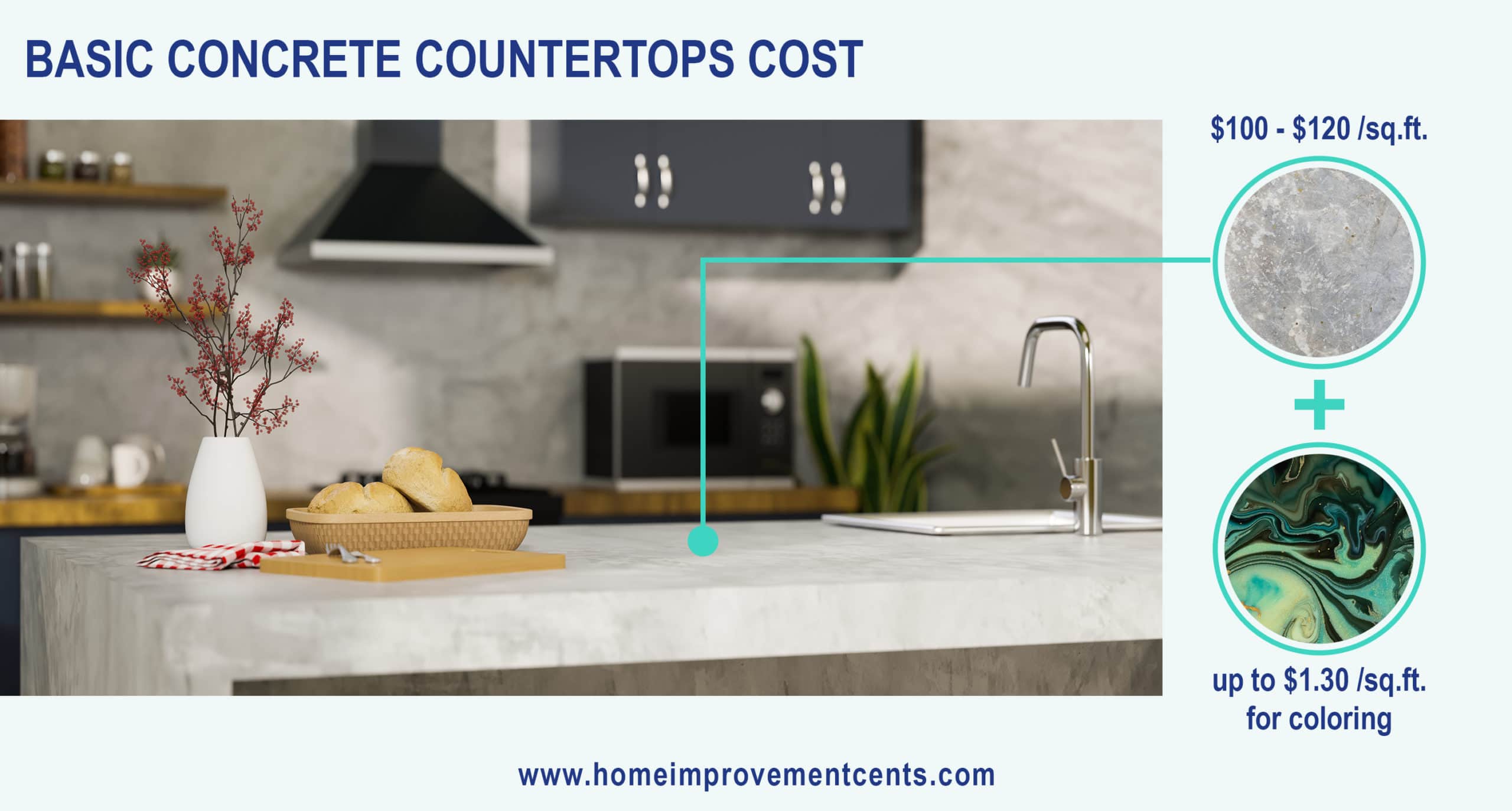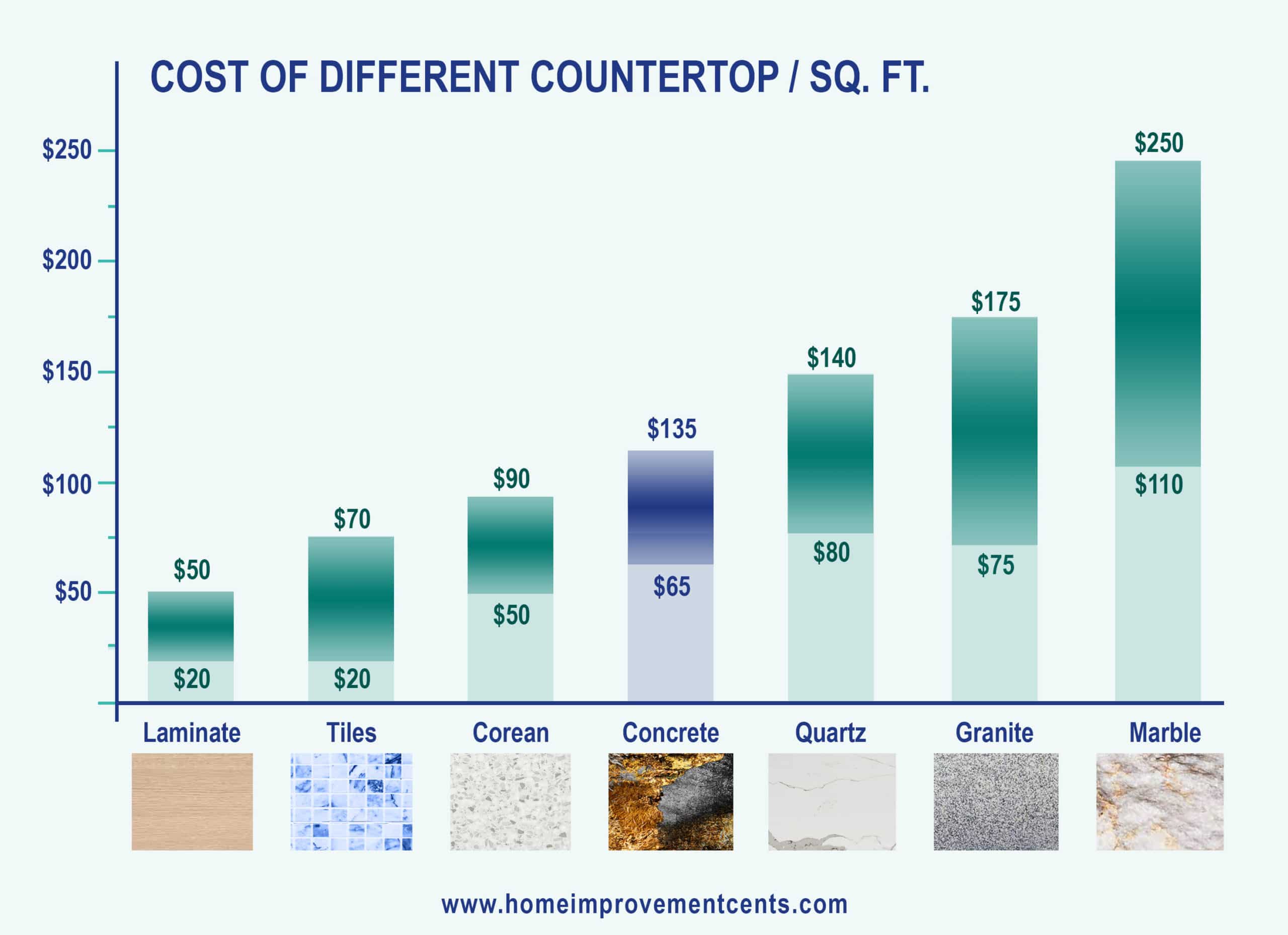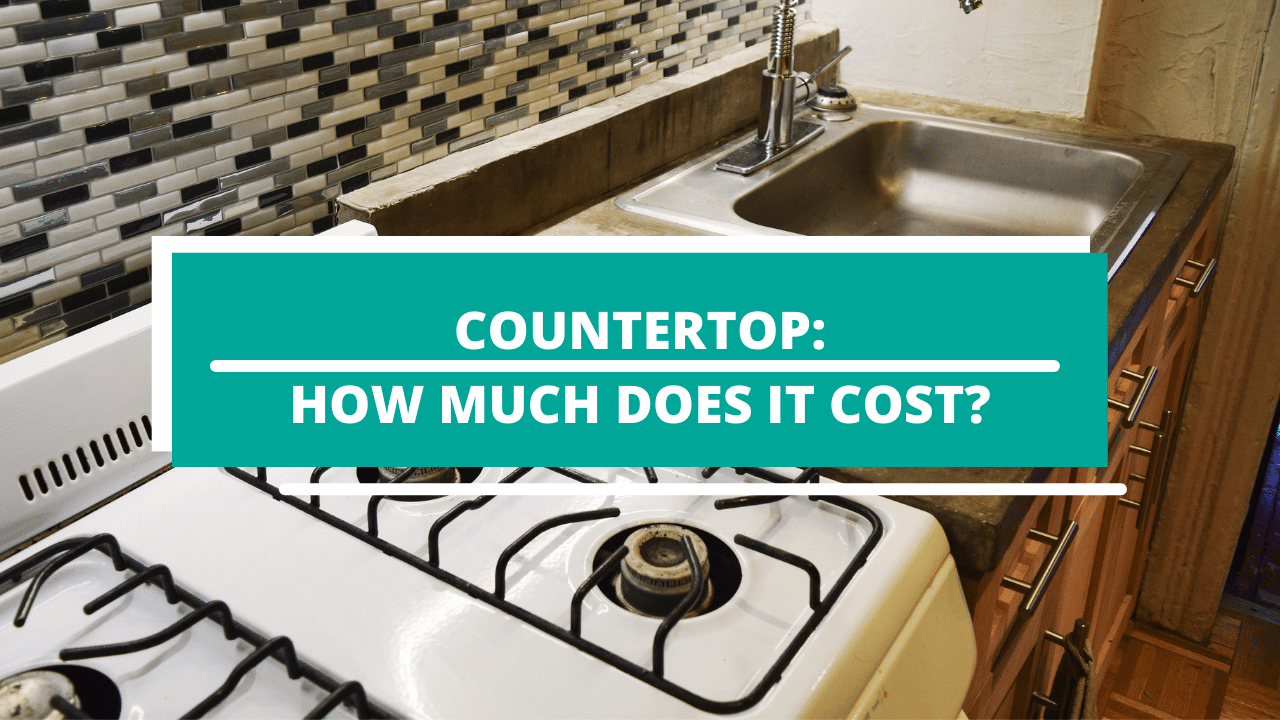If you're going for a modern look in your space, concrete countertops may have caught your eye. They're trendy and stylish. But they also have two major functional characteristics as well: they are heat resistant and they are not likely to scratch.
In this guide, we'll break down the costs and options you need to know about as a consumer.
How Much Do Concrete Countertops Cost?
The average price per square foot for a concrete countertop is $130. The pricing depends on the design, color, and other customizations desired. The average cost of hiring a professional is $3,400, but it can be as low as $1,400 if done on your own.
Concrete countertops are typically viewed as extremely cheap and efficient, and while that is true for the ingredients, they can also be very high-end and expensive. In most cases, professional countertops are tailored to meet the needs of a person. They are a fine craft of artisans with great skill. Consequently, the majority of the costs come from customization and the need for a professional.
Basic Concrete Countertops
A basic gray concrete counter is available for 100 to 120 dollars. It's colorless, stainless, or with no polish. It is dull and stark and doesn’t hold many styles.
The next step increases the amount by only around $125 per cubic foot. This will provide a more glossy finish and aid in the life of the countertops. Concrete staining is not done until the concrete is completely solid. You will add between 125 and 130 cents per square foot when you color your concrete, as well as the staining. After setting up the concrete, the color is added to the mixture or poured on.

Although these are the basics, it is still quite varied. Want to put a sink in? What texture would you like to display on top? Do you wish to include fun angles or shapes? These can all contribute to the overall cost.
Concrete Countertop Finishes
One of the amazing things about certain countertops is that they are more different in appearance than you might expect. One way to show how different concrete countertops can be is to take different finishes into account. A polished, acid stain or stained-cone countertop is the most typical choice. A concrete overlay countertop is an extra choice.
Types of Concrete Countertops


Hiring A Professional
As stated above, the bulk of the cost when hiring a contractor is paying for their time and skill. The combination and installation can be included sometimes, but the charge for time is between 40 and 70 dollars per hour.
What Does The Cost Entail?
Professional concrete countertops often come precast or cast-in. They can be poured, sealed, measured, and textured before the slabs even get to you. Although this may appear to be all that has to be done, a professional will also install or set up a shop directly at the location of the action.
In this regard, professionals generally cleanse their surface, level it, carry out additional measurements, lay it down, clean it up, and conduct a final inspection. They often have a warranty on their charges. Each of these steps is not covered by all the experts and is therefore crucial to ask first.
Finding The Right Professional
The prices for employing professionals vary depending on the economy, time of year, and competition, as with other things currently. Calling around several places is helpful to find the best price. If you do that, know what you want and your measurements as best you can to get the most accurate price. You can also have the contractor come to you and measure it before they charge you.
The best prices are found during the low season, which is usually in late autumn or early winter. This ensures less competition and more time for the contractor. However, it also helps to budget a little extra!
Concrete Countertops: We Break Down the Costs
The pricing for concrete countertops varies considerably. Concrete is a cheap alternative if you leave its natural color with a basic layout. Below you will find averages for basic, mid-range, and high-end countertops.
Low | Medium | High ($175+ per square foot) |
|---|---|---|
Comparison of Concrete Countertop Prices
The average concrete cost is within the middle range of countertop options. In general, concrete is more costly than tile, synthetic, or laminate, and less expensive than marble and at around the same price as quartz or granite countertops.
The average concrete cost is within the middle range of countertop options. In general, concrete is more costly than tile, synthetic, or laminate, and less expensive than marble and at around the same price as quartz or granite countertops.

Type | Cost |
|---|---|
Laminate | $20 - $50 |
Tile | $20 - $70 |
Synthetic Solid Surfaces (i.e. Corian) | $50 - $90 |
Concrete | $65 - $135 |
Granite | $70 - $175 |
Engineered Quartz | $80 - $140 |
Marble | $110 - $250 |
Concrete countertops are pricey as they are handmade by expert craftsmen who customize them to every size, form, or color. They often come at a premium price compared to other handmade things. But when considering concrete durability and lifespan, it is a healthy investment.

Key Considerations before Installing Countertops
Concrete Countertops: Frequently Asked Questions (FAQs)
What Is the Best Concrete to Use for Kitchen Countertops?
You can't use anything if you want concrete countertops. QuickCrete or a similar variant is the most common concrete in your local hardware shop. This is intended for drying and setting fast but is not intended to be used on countertops. You are at increased risk of shrinking, curling, or cracking on your countertop if you use it.
Rather, you want to see an option that is recommended expressly for use in concrete counters. This is fairly easy to find – it’s available online as well as many hardware chains such as Lowe’s and Home Depot.
You can make sure you apply chemicals that reduce the risk of shrinking or cracking if you are using regular concrete, which is not your best choice.
Can You Sand Concrete Countertops?
Yes! In fact, sanding your concrete countertops is a vital stage. Once the concrete appears to be dry – about three days – it can be sanded with either a standard palm sander or orbital sander.
You want to use 200 to 220 grains of sandpaper to ensure that the sealer bonds effectively with your new concrete countertop. Changing your sandpaper about every ten square feet is also vital to ensure it still has the appropriate friction. The longer you use sandpaper, the less grit you have. This will reduce the results you see by overusing them.
Sanding concrete is not exactly like wood sanding. The reason you sand concrete is that you want to open up any holes in it.

